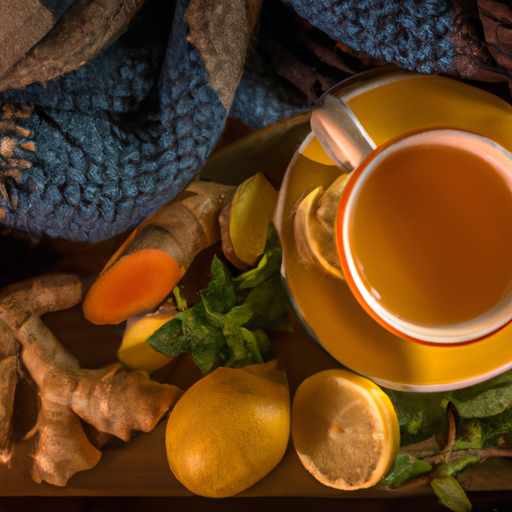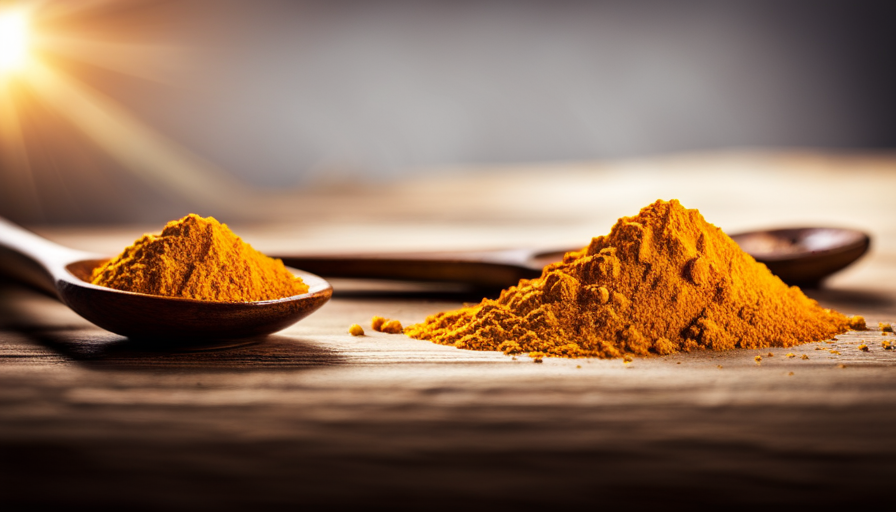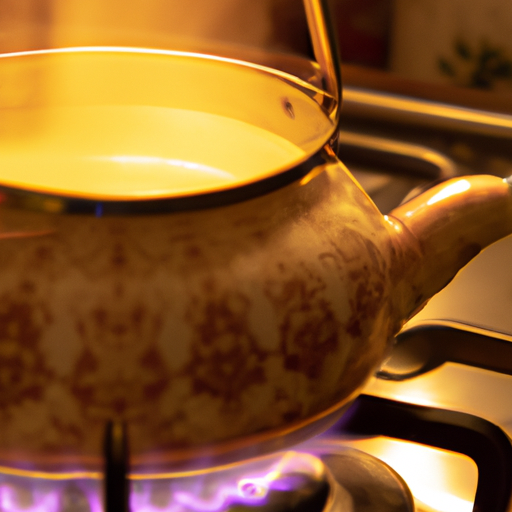Does turmeric and ginger tea help with a cold?
It’s a question many of us ask when we’re feeling under the weather. As someone who has experienced the discomfort of a cold firsthand, I understand the desire to find natural remedies that can provide relief.
Fortunately, there is scientific evidence to suggest that turmeric and ginger may have beneficial effects on cold symptoms. Both turmeric and ginger have been used for centuries in traditional medicine for their anti-inflammatory and immune-boosting properties.
In this article, we will explore the potential health benefits of turmeric and ginger, specifically their effects on the common cold. We will also discuss how to make turmeric and ginger tea, any potential side effects or precautions to consider, and other natural remedies that may help alleviate cold symptoms.
So, if you’re curious about whether turmeric and ginger tea could be a helpful addition to your cold-fighting arsenal, keep reading to find out more.
Key Takeaways
- Turmeric and ginger tea have anti-inflammatory and immune-boosting properties that can help with a cold.
- Turmeric and ginger tea may reduce inflammation, relieve symptoms of arthritis and inflammatory bowel disease, and aid in digestion.
- Turmeric and ginger tea may alleviate cold symptoms due to their anti-inflammatory, antioxidant, and antiviral properties.
- Turmeric and ginger tea should be used as a complementary treatment alongside rest, hydration, and over-the-counter medications for cold relief.
Overview of Turmeric and Ginger’s Health Benefits
Turmeric and ginger have a wide range of health benefits, making them popular choices for natural remedies. Both turmeric and ginger have been used for centuries in traditional medicine to treat various ailments.
One of the key benefits of turmeric and ginger is their anti-inflammatory properties. Curcumin, the active compound in turmeric, has been shown to reduce inflammation in the body. Ginger also contains compounds that have anti-inflammatory effects. These properties make turmeric and ginger effective in reducing inflammation and relieving symptoms associated with conditions such as arthritis and inflammatory bowel disease.
In addition to their anti-inflammatory properties, turmeric and ginger are also known for their digestive benefits. Turmeric has been used to treat digestive disorders such as indigestion and bloating. It helps stimulate the production of bile, which aids in the digestion of fats. Ginger, on the other hand, has been used to alleviate nausea and vomiting. It can also help improve digestion by increasing the movement of food through the digestive tract.
Overall, turmeric and ginger are powerful natural remedies that can support overall health and well-being. Their anti-inflammatory and digestive benefits make them valuable additions to any natural health regimen.
In the next section, we will explore how turmeric and ginger tea can help alleviate symptoms of the common cold and its causes.
Cold Symptoms and Their Causes
One interesting statistic to engage the audience is that the common cold is caused by over 200 different viruses. These viruses invade the body’s cells, leading to symptoms such as sneezing, coughing, and a runny nose. While there is no cure for the common cold, various remedies can help alleviate its symptoms.
To understand the causes of the common cold, it is important to recognize that it primarily spreads through droplets in the air or by touching contaminated surfaces. When an infected person coughs or sneezes, tiny droplets containing the virus are released into the air. If these droplets are inhaled by others or if they touch their mouth, nose, or eyes with contaminated hands, the virus can enter their body and cause a cold.
To visualize the causes of the common cold, consider the following table:
| Causes | Transmission Methods |
|---|---|
| Viruses | Airborne droplets |
| Contaminated surfaces |
Understanding the causes of the common cold is crucial in finding remedies to manage its symptoms. In the next section, we will explore the science behind turmeric and ginger’s effects on the cold, providing evidence-based information on their potential benefits.
The Science Behind Turmeric and Ginger’s Effects on the Cold
Curcumin, a compound found in turmeric, is known for its anti-inflammatory properties, which may provide relief for common cold symptoms. Turmeric and ginger have been used for centuries in traditional medicine to treat various ailments, including the common cold. Recent scientific studies have shed light on the mechanisms behind their potential effectiveness.
Here are four reasons why turmeric and ginger tea may help alleviate cold symptoms:
-
Turmeric and ginger have been found to reduce inflammation in the body, which can help ease the discomfort caused by a cold.
-
Both turmeric and ginger are rich in antioxidants, which play a crucial role in fighting off infections and boosting the immune system.
-
Turmeric has been shown to inhibit the replication of certain viruses, including those that cause the common cold.
-
Ginger has been found to have antiviral properties and may help reduce the severity and duration of cold symptoms.
By incorporating turmeric and ginger into your diet, specifically in the form of tea, you can harness their potential benefits in combating inflammation and supporting your immune system during a cold.
Now, let’s explore how to make turmeric and ginger tea.
How to Make Turmeric and Ginger Tea
To experience the full potential of these powerful ingredients, all you need is a simple recipe to create a soothing and immune-boosting elixir. Making turmeric and ginger tea is quite easy and requires only a few ingredients.
Start by boiling a cup of water in a pot. While the water’s boiling, grate a small piece of fresh ginger root and add it to the pot. Then, add half a teaspoon of ground turmeric to the pot and stir well.
Let the mixture simmer for about 10 minutes to allow the flavors to infuse. Once done, strain the tea into a cup and it’s ready to be enjoyed.
The benefits of turmeric and ginger are numerous. Turmeric contains a compound called curcumin, which has powerful anti-inflammatory and antioxidant properties. It can help boost the immune system and reduce symptoms of colds.
Ginger, on the other hand, has been used for centuries to treat respiratory infections and alleviate symptoms of colds and flu. It has antimicrobial properties that can help fight off pathogens and reduce inflammation in the respiratory tract.
Transitioning into the subsequent section about potential side effects and precautions, it’s important to note that while turmeric and ginger tea can be beneficial for colds, it’s always recommended to consult with a healthcare professional, especially if you have any underlying health conditions or are taking medications.
Potential Side Effects and Precautions
Be aware of potential side effects and precautions when incorporating turmeric and ginger into your health routine, as it’s important to prioritize your well-being and consult with a healthcare professional if you have any concerns or underlying health conditions.
While turmeric and ginger are generally considered safe for most people, there are a few side effects and precautions to be aware of.
Some individuals may experience gastrointestinal issues such as stomach upset, diarrhea, or nausea when consuming turmeric and ginger tea. It is also important to note that these spices may interact with certain medications, such as blood thinners, antiplatelet drugs, and antacids. Therefore, it’s crucial to consult with a healthcare professional if you’re taking any medications or have any existing health conditions.
In terms of dosage recommendations, there’s no standard dosage for turmeric and ginger tea. However, it’s generally recommended to start with small amounts and gradually increase as tolerated. It’s also important to note that excessive intake of turmeric and ginger may lead to certain health issues, such as liver problems and increased bleeding risk.
While turmeric and ginger tea can provide potential benefits for cold symptoms, it’s important to be aware of the potential side effects and precautions. Make sure to consult with a healthcare professional before incorporating turmeric and ginger into your routine, especially if you have any concerns or underlying health conditions.
Moving forward, let’s explore other natural remedies for colds.
Other Natural Remedies for Colds
Try incorporating other natural remedies into your routine to alleviate cold symptoms. There are several alternative treatments that may help boost your immune system and provide relief. Consider the following options:
-
Echinacea: This herb has been used for centuries to support the immune system and reduce the severity of cold symptoms. It may help shorten the duration of a cold and provide some relief from congestion.
-
Honey: Adding a spoonful of honey to warm water or herbal tea can soothe a sore throat and provide a natural cough suppressant. It also has antimicrobial properties that may help fight off the infection causing the cold.
-
Vitamin C: Increasing your intake of vitamin C through foods like citrus fruits, strawberries, and leafy greens can help support your immune system and reduce the duration and severity of a cold.
-
Garlic: Known for its antimicrobial properties, garlic can help fight off cold-causing viruses and bacteria. Adding fresh garlic to your meals or taking garlic supplements may aid in reducing cold symptoms.
-
Steam inhalation: Inhaling steam from a hot shower or a bowl of hot water can help alleviate congestion and soothe irritated nasal passages.
While turmeric and ginger tea may have some potential benefits for colds, there are other natural remedies worth considering. These alternative treatments, such as echinacea, honey, vitamin C, garlic, and steam inhalation, have shown evidence of supporting the immune system and alleviating cold symptoms.
Conclusion: Should You Try Turmeric and Ginger Tea for a Cold?
You’ll definitely want to consider the potential benefits of incorporating turmeric and ginger tea into your routine for a cold. Turmeric and ginger are both known for their anti-inflammatory and antioxidant properties, which can help support the immune system and reduce symptoms of a cold.
One of the pros of turmeric and ginger tea is that it’s a natural remedy that can be easily made at home. It’s also believed to have antimicrobial properties, which may help fight off the virus or bacteria causing the cold. Additionally, turmeric and ginger have been used for centuries in Ayurvedic medicine to treat various ailments, including colds and respiratory infections.
On the other hand, it’s important to note that while turmeric and ginger tea may provide some relief for cold symptoms, it’s not a cure. It should be used as a complementary treatment alongside other cold remedies, such as rest, hydration, and over-the-counter medications.
Comparing turmeric and ginger tea to other natural cold remedies, such as honey and lemon tea or echinacea tea, there’s limited scientific evidence to support their effectiveness. However, many people have reported experiencing relief from cold symptoms after consuming turmeric and ginger tea.
Incorporating turmeric and ginger tea into your routine for a cold may have some potential benefits, such as boosting the immune system and reducing inflammation. However, it should be used as part of a comprehensive approach to cold relief and not relied upon as a sole treatment.
Frequently Asked Questions
Can turmeric and ginger tea completely cure a cold?
Turmeric and ginger tea can provide relief from cold symptoms, but it is not a guaranteed cure. It may help boost the immune system, reduce inflammation, and soothe a sore throat, but other treatments should also be considered.
How long does it take for turmeric and ginger tea to start working on a cold?
Turmeric and ginger tea can start working on a cold within a few hours. The benefits of turmeric and ginger tea come from their anti-inflammatory properties and immune-boosting ingredients, which can help alleviate symptoms and support the immune system.
Can turmeric and ginger tea be used as a preventive measure for colds?
Turmeric and ginger tea can be a natural cold remedy and boost our immune system. The powerful combination of these ingredients acts like a shield, protecting our body from colds and other illnesses.
Are there any specific dosages or ratios of turmeric and ginger that should be used in the tea for maximum effectiveness?
There is no specific dosage or ratio for turmeric and ginger tea, but it is generally safe to consume. Turmeric and ginger have various health benefits, including anti-inflammatory and antioxidant properties that can support overall health.
Can turmeric and ginger tea be consumed by children and pregnant women?
Children and pregnant women should exercise caution when consuming turmeric and ginger tea. Safety concerns and potential side effects may arise. Consult a healthcare professional for guidance on appropriate consumption.
Conclusion
After extensive research and analysis, it can be concluded that turmeric and ginger tea might be a potential remedy for a cold. The health benefits of these natural ingredients are well-documented, and their anti-inflammatory properties could help alleviate cold symptoms.
However, it’s important to note that there is limited scientific evidence supporting their direct effect on the cold. While turmeric and ginger tea may offer some relief, it is always advisable to consult a healthcare professional before relying solely on natural remedies.
So, go ahead and give it a try, but don’t forget to keep your expectations in check.










